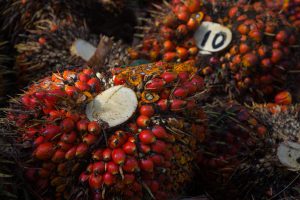Yesterday, Reuters reported that Indonesia and Malaysia, two of the world’s largest producers of palm oil, are joining forces to lobby against proposed regulatory changes that could restrict sales of the product within the European Union.
According to the report, the two nations, working via the Council of Palm Oil Producing Countries (CPOPC), are seeking to hire an advocacy firm to campaign in Europe to counter criticisms and fight the introduction of tighter regulations.
As part of its mooted European Green Deal, the EU is set to begin discussions this year on several new regulations on deforestation and sustainable food systems, which could restrict the use of palm oil in food and fuel.
There’s a lot of money on the line. Cheap and almost magically versatile, palm oil can be found in roughly half the products on supermarket shelves – from lipstick and pizza to biodiesel – and demand for it has quadrupled over the past two decades. Between them, Indonesia and Malaysia produce the lion’s share of the world’s estimated $65 billion annual palm oil supply, and the EU is their third-largest market.
The joint advocacy effort underscores the industry’s increasingly negative reputation amongst consumers, especially in the West. Palm oil producers in Indonesia and Malaysia have been accused of clearing vast areas of rainforests in Borneo and peninsular Malaya to make way for plantations, and presiding over hideous working conditions.
These claims have been detailed in a series of lengthy investigations published by The Associated Press last year, which depicted a largely unregulated industry rife with exploitation. The AP investigations detailed cases in which workers had been cheated, threatened, or held against their will to pay off Sisyphean debts – to say nothing of the atrocious working conditions on some plantations.
One of the reports focused on the particularly plight of women plantation workers, many of them migrants, who experienced harassment and rape at the hands of plantation overseers, in addition to being lumped with some of the most grueling jobs on the plantations. The AP reports also linked abuses to mills and plantations that have been certified by the Roundtable on Sustainable Palm Oil, an association that promotes ethical production, including provisions to safeguard workers.
This comes as Malaysia launched a complaint against the EU at the World Trade Organization challenging the bloc’s Renewable Energy Directive II, created in 2019, aims to phase out palm oil from renewable fuel stocks by 2030 due to concerns about deforestation. Indonesia launched a similar complaint in 2019.
Despite this past advocacy, Reuters notes that this is the first time that Indonesia and Malaysia are working together to fight the growing anti-palm oil sentiment.
This is part of a much wider pushback in many Western markets, in which increasing numbers of products feel the need to label their products “palm oil free.” This now appears to be hitting producers’ bottom line.
According to the Reuters report, which cited figures from the U.S. Department of Agriculture, EU imports in the 2020-21 season are forecast to fall to the lowest in a decade, sliding down 8 percent from the previous season. This is likely an effect of the COVID-19 pandemic, but also the eroding effect of negative consumer sentiment. This suggests that the industry might struggle to win over European legislators, now that the tide of consumer sentiment has turned.
































